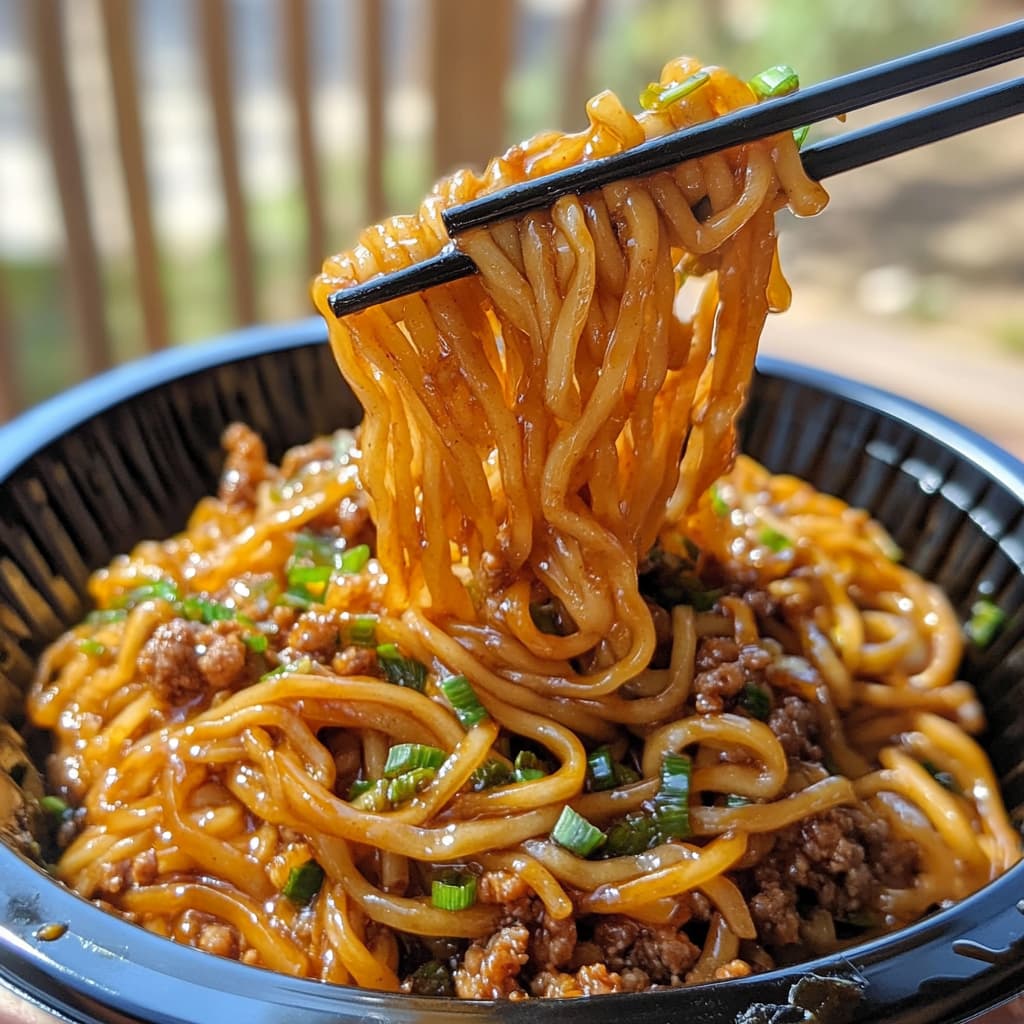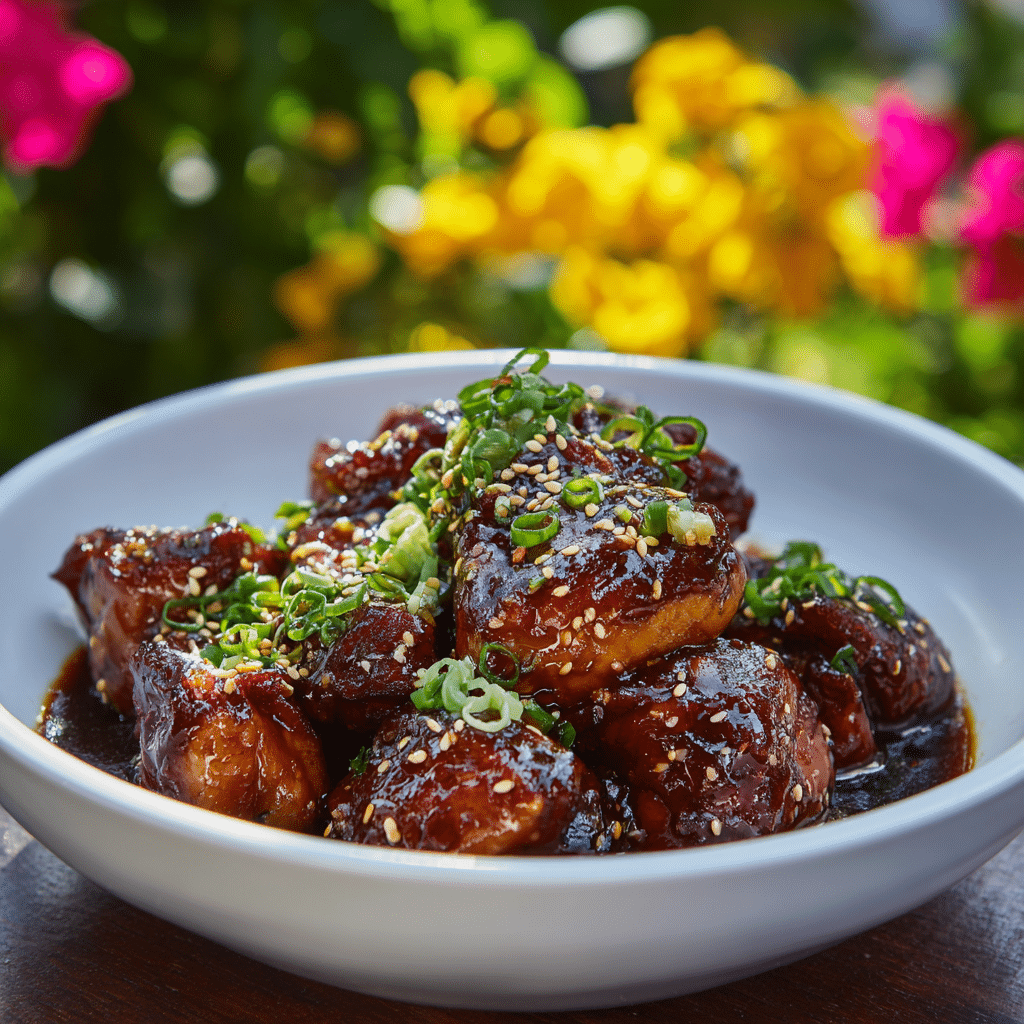Craving that sweet, savory, and slightly sticky beef stir-fry you get from your favorite Chinese takeout? This Mongolian beef recipe is your fast, flavorful solution. With crispy-edged beef slices coated in a glossy garlic-soy sauce, this dish is quick to prepare and pairs beautifully with rice or noodles.
No fancy ingredients needed—just flank steak, soy sauce, ginger, garlic, and a touch of brown sugar. The result? A restaurant-style dish ready in under 30 minutes.
Looking for more Asian-style meals? Check out our Vegetable Beef Soup Recipes for another cozy and protein-rich option.
What is Mongolian Beef and Where Did It Come From?
📍 Misleading Name, Delicious Dish
Despite the name, Mongolian beef is not a traditional dish from Mongolia. It was invented in Taiwanese restaurants and gained huge popularity in Chinese-American cuisine across the U.S. It’s known for its:
-
Crispy beef
-
Rich, soy-based sauce
-
Speedy stir-fry method
This recipe brings you the same bold flavor and glossy texture you get from takeout—but faster and fresher.
Common in Asian-American Menus
Mongolian beef usually features:
-
Thin slices of flank steak
-
Stir-fried aromatics (garlic and ginger)
-
A sweet-savory sauce with brown sugar and soy
-
Served over white rice or noodles
Looking for more Asian-inspired comfort food? Try our Ultimate Chicken & Broccoli Stir-Fry—a colorful, veggie-packed dish ready in under 30 minutes.
Essential Ingredients for Mongolian Beef
Choosing the Right Cut
Flank steak is lean, tender, and absorbs sauce well. Other great options:
-
Skirt steak (rich flavor)
-
Top sirloin (budget-friendly)
-
Ribeye (for extra tenderness)
TIP: For extra-thin slices, freeze the steak for 15–20 minutes before cutting.
Sauce Breakdown
| Ingredient | Flavor Role |
|---|---|
| Soy Sauce | Salty umami base |
| Brown Sugar | Sweetness & thickening |
| Garlic & Ginger | Sharp, aromatic depth |
| Water | Thins out and balances the mix |
| Sesame Oil | Adds nutty, toasty finish |
Aromatics + Extras
-
Green onions
-
Crushed red pepper (for heat)
-
Cornstarch (for beef coating)
-
Sesame seeds (optional garnish)
Step-by-Step Instructions for Crispy Mongolian Beef
Step 1: Prepare the Beef
-
Slice flank steak against the grain
-
Toss with cornstarch and let sit 10 minutes
-
This creates a crisp coating and locks in moisture
Step 2: Sear the Beef
-
Heat 2 tbsp vegetable oil in a hot skillet
-
Cook beef in small batches to avoid steaming
-
Fry 2–3 minutes each side until golden and crispy
Step 3: Make the Sauce
In the same pan:
-
Sauté garlic and ginger for 30 seconds
-
Add soy sauce, brown sugar, sesame oil, and water
-
Simmer until the sauce thickens (2–3 minutes)
Step 4: Combine
-
Return the beef to the pan
-
Toss until coated in glossy sauce
-
Add green onions and cook for 1 minute
-
Serve immediately over rice or noodles
Best Ways to Serve Mongolian Beef
Classic Pairings
-
Steamed white or jasmine rice
-
Fried rice or noodles
-
Cauliflower rice (for low-carb diets)
Add a Side of Veggies
Make it a complete meal with:
-
Steamed broccoli or snow peas
-
Stir-fried bell peppers or zucchini
-
Asian-style cucumber salad
Don’t miss our Creamy Garlic Chicken with Roasted Baby Potatoes for a satisfying low-effort meal prep idea.
Creative Variations
🌶️ Spicy Mongolian Beef
-
Add 1 tsp chili garlic sauce to the mix
-
Stir in red chili flakes or Sriracha
Veggie-Packed Version
-
Add stir-fried veggies directly into the sauce
-
Use mushrooms, bok choy, or baby corn for flavor and texture
Low-Carb/Keto Option
-
Use coconut aminos instead of soy sauce
-
Serve with cauliflower rice
-
Add avocado slices or crunchy slaw
Storage, Meal Prep, and Reheating
Refrigeration
-
Store in airtight container for up to 3 days
-
Reheat in a skillet over medium heat with a splash of water
Freezing Instructions
-
Freeze cooked beef and sauce separately
-
Store up to 2 months in freezer-safe containers
-
Thaw in fridge overnight before reheating
Make Ahead
-
Slice and coat beef with cornstarch the night before
-
Keep sauce premixed in a jar in the fridge
-
Just sear and combine when ready to eat
FAQs About Mongolian Beef
1. Is Mongolian beef sweet or spicy?
It’s primarily sweet and savory, but you can add spice to taste.
2. Can I use chicken instead of beef?
Yes! Use boneless skinless chicken thighs or breasts.
3. Is Mongolian beef healthy?
It’s high in protein but can be sugary and salty. Reduce brown sugar and serve with vegetables for a healthier version.
4. What’s the best oil for stir-frying?
Neutral oils with a high smoke point like vegetable, avocado, or peanut oil.
5. What’s the difference between Mongolian beef and Szechuan beef?
Szechuan beef is spicier and more peppery, while Mongolian beef is sweeter and more sauce-heavy.
Conclusion
If you want a lightning-fast, flavor-packed stir-fry, Mongolian beef is your ultimate go-to. Whether you’re craving something bold for dinner or looking to impress guests without spending hours in the kitchen, this dish has your back.
Crispy, sticky, and irresistibly saucy—it’s better than takeout every time.
Looking for more delicious dishes with bold sauces? Don’t miss our Creamy Paprika Chicken with Herb Potatoes—a one-pan meal loaded with comfort.
Tips for Perfecting Mongolian Beef at Home
Don’t Skip the Cornstarch
Coating the beef with cornstarch is essential—it helps create that restaurant-style crisp crust when fried, and it also thickens the sauce as it cooks.
Use High-Heat Cooking
Stir-frying is all about quick, high-temperature cooking. Make sure your pan or wok is hot before adding the beef to ensure searing, not steaming.
Balance the Sauce
If it tastes too salty, add a splash of water or a bit more brown sugar. If it’s too sweet, increase soy sauce or add a dash of rice vinegar.
Don’t Overcrowd the Pan
Cook the beef in small batches. Too much in the pan will drop the temperature and result in soggy, steamed meat instead of that nice caramelized texture.
Nutritional Breakdown & Substitutions
Nutritional Highlights (Per Serving Estimate)
| Nutrient | Amount |
|---|---|
| Calories | ~360 |
| Protein | ~26g |
| Fat | ~18g |
| Carbohydrates | ~20g |
| Sugar | ~10g |
| Sodium | Moderate (adjust with low-sodium soy sauce) |
This dish is high-protein and low in carbs when served without rice.
Healthy Swaps
-
Use low-sodium soy sauce to reduce salt
-
Swap brown sugar for coconut sugar or monk fruit sweetener
-
Use olive oil or avocado oil instead of vegetable oil
-
Try zucchini noodles or cauliflower rice as low-carb bases
History and Cultural Influence
While not native to Mongolia, the dish represents a fusion of Taiwanese culinary influence and American preferences, especially during the rise of Chinese-American cuisine in the 1970s–1980s.
It became popular in Chinese restaurants across the U.S. due to:
-
Familiar beef-based flavor
-
Sweet sauce appeal to American palates
-
Easy to prepare and customize
Today, Mongolian beef is a beloved takeout favorite in restaurants like PF Chang’s and Panda Express—and even more delicious when made at home.
Pairing Mongolian Beef with Other Dishes
Create a restaurant-style dinner table by pairing Mongolian beef with:
Starters
-
Egg drop soup
-
Wonton soup
-
Spring rolls or dumplings
Side Dishes
-
Fried rice or veggie stir-fry
-
Lo mein noodles
-
Garlic green beans
-
Chinese cabbage salad with sesame dressing
Drinks
-
Chilled green tea or jasmine tea
-
Light beer
-
Lemon water with fresh ginger
How to Make a Large Batch for Meal Prep or Events
Planning for a party or prepping meals for the week?
-
Use 2–3 pounds of flank steak and double the sauce
-
Cook in batches and combine in a large pot
-
Portion into containers with rice or vegetables
-
Freeze individual portions for easy weeknight dinners
Pro Tip: Keep the sauce separate for best texture when reheating!
Why Mongolian Beef is Great for Beginners
If you’re new to stir-frying or Asian-style cooking, Mongolian beef is a great entry point because:
-
No fancy equipment required (just a skillet!)
-
Simple ingredients available at any grocery store
-
Flexible recipe—easy to tweak based on what’s in your pantry
-
Fast: from fridge to table in under 30 minutes
FAQs: Frequently Asked Questions About Mongolian Beef
1. What cut of beef is best for Mongolian beef?
Flank steak is the most popular choice due to its lean texture and ability to absorb flavor. You can also use skirt steak, top sirloin, or ribeye for tender results.
2. Is Mongolian beef spicy?
No, it’s more sweet and savory than spicy. However, you can spice it up by adding crushed red pepper flakes, chili garlic sauce, or fresh chilies.
3. Can I make Mongolian beef gluten-free?
Absolutely. Use gluten-free soy sauce (like tamari), and ensure your cornstarch and other ingredients are certified gluten-free.
4. How long can I store Mongolian beef?
Store in an airtight container in the refrigerator for up to 3 days, or freeze for up to 2 months.
5. What’s the difference between Mongolian beef and Szechuan beef?
Mongolian beef is sweet, mild, and saucy. Szechuan beef is spicier, often oilier, and made with Szechuan peppercorns for a numbing kick.
6. Can I substitute chicken for the beef?
Yes! Chicken thighs or breasts work great in place of beef. Follow the same cooking method.
7. How do I make the beef crispy like restaurants?
Coat the beef in cornstarch and cook in small batches over high heat. Avoid overcrowding the pan for the best sear and texture.
Print
Mongolian Beef Recipe: Sweet, Savory, and Better Than Takeout
- Total Time: 25 minutes
- Yield: 4 servings
Description
This Mongolian Beef is a quick, better-than-takeout dish made with crispy flank steak coated in a sticky, sweet-savory garlic soy sauce. Ready in under 30 minutes, it’s a weeknight favorite that delivers bold Asian-inspired flavor with minimal effort.
Ingredients
-
1 lb flank steak, thinly sliced against the grain
-
1/4 cup cornstarch
-
2 tablespoons vegetable oil
-
3 cloves garlic, minced
-
1 tablespoon fresh ginger, minced
-
1/2 cup low-sodium soy sauce
-
1/3 cup brown sugar, packed
-
1/4 cup water
-
1 teaspoon sesame oil
-
2–3 green onions, chopped (plus more for garnish)
-
Sesame seeds for topping (optional)
-
Steamed white rice, for serving
Instructions
-
Toss the sliced flank steak in cornstarch until evenly coated. Let sit for 10 minutes.
-
In a small bowl, whisk together soy sauce, brown sugar, water, and sesame oil. Set aside.
-
Heat vegetable oil in a large skillet or wok over medium-high heat.
-
Fry the steak in batches for 2–3 minutes per side until browned and crispy. Remove and set aside.
-
In the same pan, add a bit more oil if needed and sauté garlic and ginger for 30 seconds.
-
Pour in the sauce mixture, bring to a simmer, and cook for 2–3 minutes until slightly thickened.
-
Return the cooked beef to the pan and stir to coat in the sauce.
-
Add green onions and stir for 1 minute.
-
Serve hot over steamed rice and garnish with sesame seeds and extra green onions.
Notes
-
For extra crispiness, pat the beef dry before coating with cornstarch.
-
Adjust sweetness by reducing or increasing brown sugar to taste.
-
This dish reheats well, making it great for meal prep.
-
You can substitute chicken or tofu for a different protein twist.
- Prep Time: 10 minutes
- Cook Time: 15 minutes





